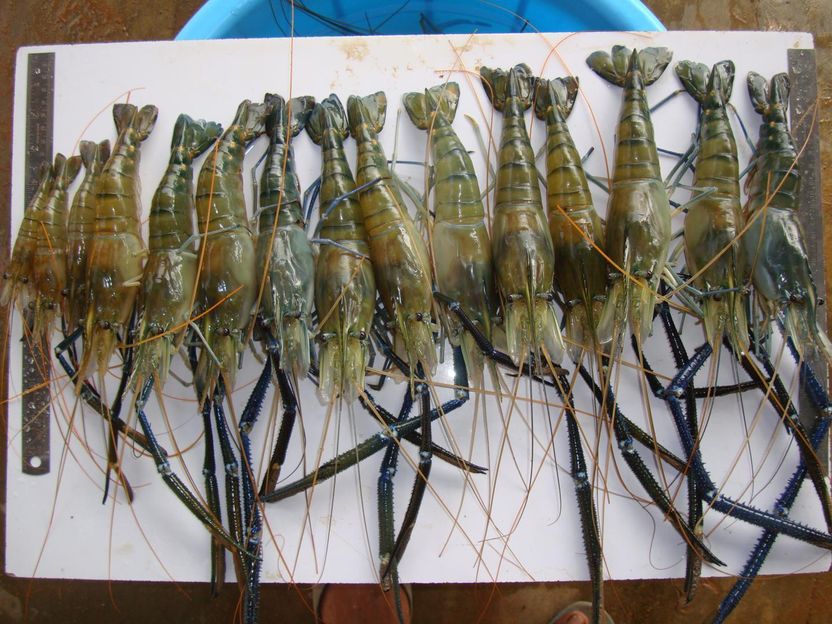Super Shrimp Developed by Ben-Gurion University of the Negev
Single-sex prawns could help alleviate poverty, reduce disease and protect the environment, according to researchers at Ben-Gurion University of the Negev (BGU) who have developed a monosex prawn that may make this winning trifecta possible.

In a groundbreaking study in Nature's Scientific Reports, the BGU group highlights the development of a 'super shrimp' which, for the first time, only produces female offspring. The emergence of an all-female population could both increase aquaculture yields as well as serve as a natural agent to prevent the spread of harmful, water-bound parasites.
Dr. Eli Aflalo
In a groundbreaking study in Nature's Scientific Reports, the BGU group highlights the development of a "super shrimp" which, for the first time, only produces female offspring. The emergence of an all-female population could both increase aquaculture yields as well as serve as a natural agent to prevent the spread of harmful, water-bound parasites.
To achieve an efficient biotechnology for all-female aquaculture in the economically important prawn (Macrobrachium rosenbergii), the researchers achieved - for the first time - WW males using androgenic gland cells transplantation which caused full sex-reversal of WW females to functional males. Crossing the WW males with WW females yielded all-female progeny lacking the Z chromosome.
Click here for photo of super shrimp (Photo credit: Dr. Eli Aflalo)
The research is being conducted by BGU Prof. Amir Sagi, who also serves as a member of the National Institute for Biotechnology in the Negev (NIBN), and his Ph.D. student, Tom Levy, in collaboration with Enzootic, a Beer-Sheva, Israel-based startup company specializing in all-female monosex aquaculture biotechnologies.
"We were able to achieve the monosex population without the use of hormones or genetic modifications and thus address two major agricultural considerations: monosex populations and ecological concerns," says Levy. "Prawns serve as efficient biocontrol agents against parasite-carrying snails. And since we can now use monosex prawns, which do not reproduce, it reduces the hazard of prawns becoming an invasive species."
The publication follows a study published in July in Nature Sustainability showing that freshwater prawn species serve as a biocontrol agent by preying on aquatic snail species. The snails serve as intermediate hosts of the parasite that causes schistosomiasis in sub-Saharan Africa.
"With monosex prawns at profit-maximizing densities, the prawns substantially reduce intermediate host snail populations and aid schistosomiasis control efforts," says Prof. Sagi. "Integrated aquaculture-based interventions can be a win-win strategy in terms of health and sustainable development in schistosomiasis endemic regions of the world."
Schistosomiasis is an acute and chronic disease caused by parasitic worms that can result in severe abdominal pain, diarrhea and blood in the stool. In women, urogenital schistosomiasis may present with genital lesions, vaginal bleeding, pain during sexual intercourse, and nodules in the vulva. In men, urogenital schistosomiasis can induce pathology of the seminal vesicles, prostate and other organs. The World Health Organization estimates that at least 220.8 million people each year require preventive treatment for the disease.
In this study, Prof. Sagi and Dr. Amit Savaya of BGU joined forces with a large team of researchers around the world headed by Prof. Giulio De Leo of Stanford University to outline control strategies, drawing on both prawn aquaculture to reduce intermediate host snail populations and mass drug administration to treat infected individuals. Integrating both methods is found to be superior to either one alone.
Most read news
Topics
Organizations
Other news from the department science

Get the food & beverage industry in your inbox
By submitting this form you agree that LUMITOS AG will send you the newsletter(s) selected above by email. Your data will not be passed on to third parties. Your data will be stored and processed in accordance with our data protection regulations. LUMITOS may contact you by email for the purpose of advertising or market and opinion surveys. You can revoke your consent at any time without giving reasons to LUMITOS AG, Ernst-Augustin-Str. 2, 12489 Berlin, Germany or by e-mail at revoke@lumitos.com with effect for the future. In addition, each email contains a link to unsubscribe from the corresponding newsletter.


























































